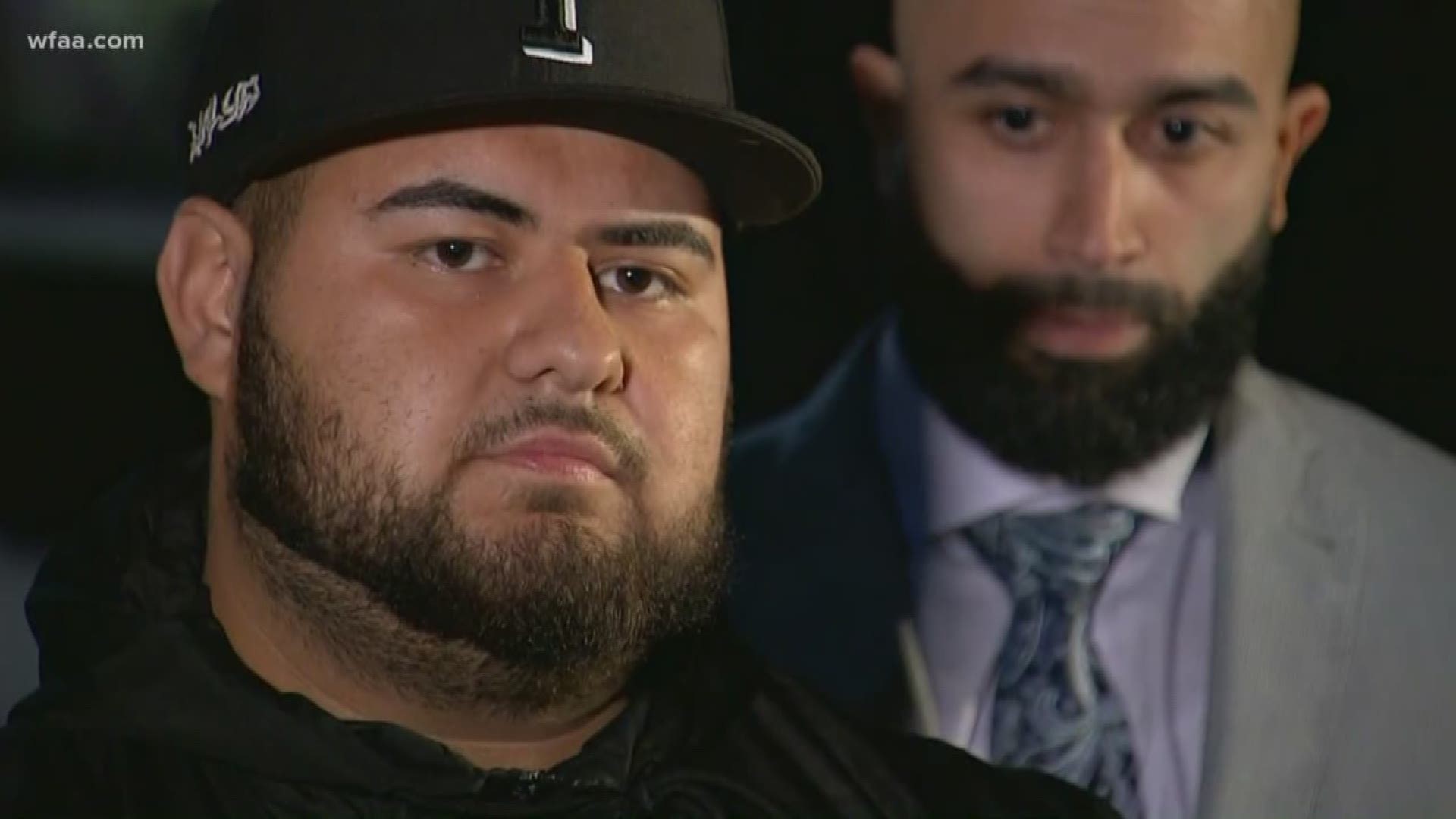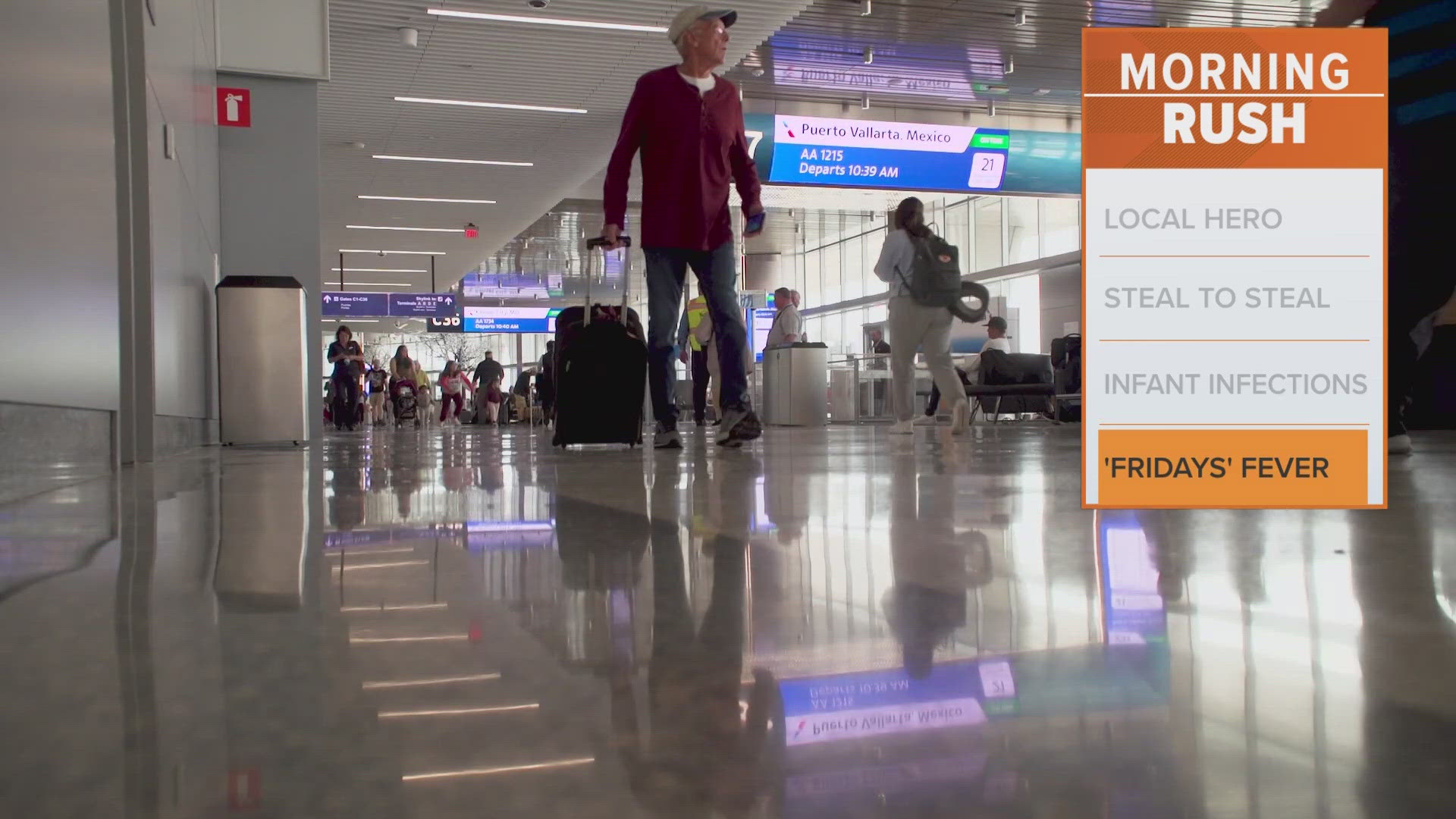A man who was arrested — and later released — in the killing of two people at a Halloween party in Greenville is suing the Hunt County sheriff and the Texas Rangers, saying he was falsely arrested and imprisoned.
Brandon Gonzales, 24, seeks more than $3 million in damages because he was "illegally incarcerated."
The federal lawsuit was filed Wednesday — one year after Gonzales was arrested on a capital murder charge, less than 48 hours after the deadly shooting at The Party Venue in Greenville.
Gonzales was in jail for nine days before the Hunt County sheriff asked the district attorney to drop the charge.
Kevin Berry Jr. and Byron Craven Jr., both 23 years old, were killed at the party. Fourteen others were injured.
The federal lawsuit says Gonzales attended the party but was outside on a FaceTime call at the time of the shooting.
About 750 people were inside the venue when a gunman opened fire at the homecoming party, about about 20 miles from Texas A&M University-Commerce.
Hunt County Sheriff Randy Meeks said in the days after the shooting that the first victim was likely the target. Authorities said the shooter hit a targeted person first and then randomly fired into the crowd.
The federal lawsuit alleges Meeks, the sheriff's office, the Texas Department of Public Safety and Texas Ranger David Armstrong falsely arrested and imprisoned Gonzales.
The suit says the law enforcement officers and agencies maliciously prosecuted him, abused the process and intentionally inflicted emotional distress. Gonzales is also suing Jane Doe, a witness in the case.
The sheriff's office and the Texas Rangers have not yet responded to a request for comment.
'One of the worst feelings'
Gonzales, a father of three young children, was arriving at his job at an auto dealership in Greenville when he was arrested.
"They came at me with guns drawn," Gonzales told WFAA in 2019. "It was really one of the worst feelings I've ever felt in my life."
The arrest warrant affidavit says that a "source of information" contacted authorities about the shooting, which led to the identification of Gonzales.
But, the lawsuit says, several people went to the jail to say Gonzales was innocent. The suit also says that law enforcement did not identify the "source of information," who was the basis for Gonzales' arrest.
Gonzales told authorities that he was at the party but was not inside at the time of the shooting, according to the lawsuit.
The suit says Texas Ranger David Armstrong told Gonzales "he didn't believe him and he would make sure that Brandon gets the needle."
Despite widespread claims that the Hunt County Sheriff’s Office made a mistake charging Gonzales with capital murder, investigators insisted they got it "100%" right.
The witness told authorities that Gonzales was playing dice in a restroom around 11:30 p.m. The person saw Gonzales leave the restroom, draw a gun from his waist and start shooting, according to authorities.
Meeks said witnesses weren't forthcoming at first.
"We just kept pushing and pushing until people finally started coming forward," Meeks said of how investigators identified Gonzales as the shooter.
According to the lawsuit, Gonzales got to the party around 11 p.m., but it was packed, dark and "tremendously hot."
After "it became too hot and unbearable," Gonzales went outside to his friend's car, where he made a FaceTime call to a friend in Paris, Texas.
The suit says that Gonzales was sitting in the car when "he saw everyone scatter and run out of the venue frantically."
The shooting occurred around 12:05 a.m.
Gonzales waited for his friends and then they left, the suit says.
Lacked probable cause
The federal lawsuit says investigators "lacked probable cause" to arrest Gonzales on the capital murder charge.
After the arrest, attorneys Andrew W. Wilkerson and Michael Campbell Jr. "insisted that the prosecutor turn over pre-indictment discovery."
They received one document: the arrest warrant affidavit, according to the lawsuit.
That affidavit cites the information from the "source of information."
The source was never revealed to Gonzales' attorneys, who never received the specific evidence mentioned in the affidavit including the statement, pictures of Gonzales or the diagram, the lawsuit said.
When the sheriff's office asked the Hunt County District Attorney to drop the case against Gonzales, the office said it was "due to the lack of cooperation from witnesses and discovery of exculpatory evidence during the course of the investigation."
Exculpatory evidence is information that could potentially clear an accused person.
The federal lawsuit alleges that the law enforcement officers and agencies accepted "unreliable and inaccurate" information from the witness and rushed the investigation to quell the "public's frustration."
"It is unconscionable that these entities would rush to judgment in less than 72 hours of naming our client the prime suspect of such a heinous crime on national news without adequate or reliable information," the lawsuit states.
The suit says the sheriff's office, Meeks and Armstrong with the Texas Rangers "showed no interest in the immense amount of evidence that was provided to them that [Gonzales] was innocent."
'Irreparable harm'
After spending about nine days in jail, Gonzales was released on Nov. 5, 2019.
The suit says he suffered "irreparable harm" and lost his job and was unable to get another "due to the bad publicity."
He "became infamous around town as a mass murderer," the lawsuit claims. "He would be followed around stores and people would point at him and call him a murderer."
He decided to move closer to his mother in Kissimmee, Fla., but the story had spread and when he landed in the airport, people questioned and followed him, according to the lawsuit.
He became anxious and depressed due to the "false accusations," according to the lawsuit, and had a hard time finding work in Florida as well.
The lawsuit claims the sheriff's office and Texas Department of Safety "should have known" the false arrest would be reported in the media, which it widely was.
The lawsuit said that as a result, Gonzales' reputation was severely damaged among family, friends and co-workers.
Gonzales' attorneys have demanded a trial by jury in the lawsuit as a result, asking for at least $3.15 million in damages, plus counsel fees.




